38 Divided by a Common Language IV, PG-13 Edition
Posted by Christine on Mar 9, 2015 in Ireland | 4 comments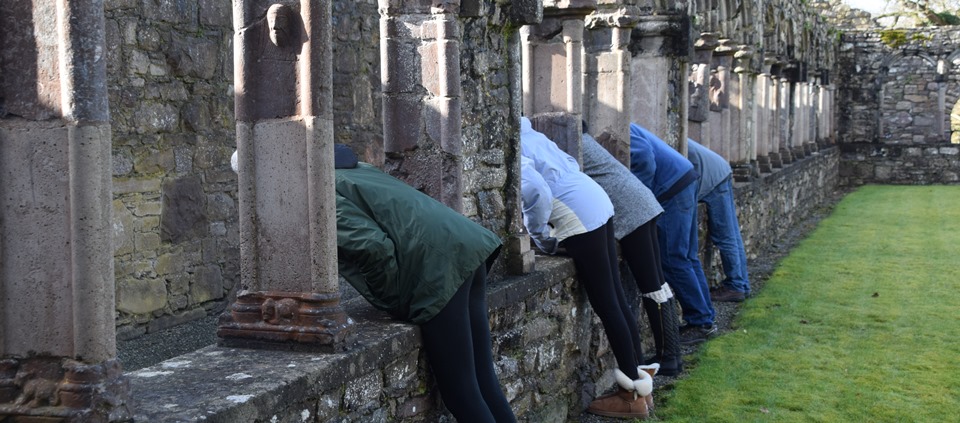
I have to confess that I am suffering from “language creep,” a term I invented that probably has an equivalent in the science of linguistics. I’ve been living in Ireland long enough that the line between American English and Irish English is starting to blur: expressions, usages, and pronunciations that sounded strange to me at the beginning of my stay are starting to seem normal and are even creeping into my vocabulary. People who spend a lot of time in both North America and Britain are sometimes accused of having an “Atlantic” accent, a ghastly hybrid of the two tongues, part eagle or beaver and part lion. I’m not quite there yet, nor am I in danger of “going native”—dressing in a long skirt and shawl and carrying a basket of turf as I stroll barefoot on the rocky shore. Women dressed that way were once held up as the image of Irish womanhood and today are derisively called “shawlies,” by the way. But the strange mixture of words and sounds in my head is unsettling. I am shocked when someone recognizes within seconds of my opening my mouth that I am American, which they always do, of course: to me my speech doesn’t seem that different from theirs, but that only shows how badly I am afflicted by language creep.
A few weeks ago I met a lovely woman down in Kilkenny named Helen whose speech was a veritable gold mine of unusual and vivid expressions. Her conversation was so interesting and her words so perfectly chosen that I could have talked to her all day. She was telling the story of the long and complicated process of renovating her home when she began one of her colorful sentences with the phrase “Between the jigs and the reels” to mean “With one thing and another.” Jigs and reels are, of course, types of musical pieces with distinct tempos, jigs being faster than reels. The phrase also brings nice mechanical imagery to mind: without too much stretching, jigs and reels could be machine parts, and the expression would still work well to mean something along the lines of “I had to deal with many different complications.”
Helen was the owner of the bed and breakfast where we stayed. We asked her if she was also the chef, and she said “Yes, I’m the chef and the slosher,” by which we assumed that she meant she cooks the breakfasts and does the dishes afterwards. But Helen might also have been using her own unique version of the phrase “chief cook and bottle washer” to say that she does all the jobs, as often happens in a small business. Certainly that was what we witnessed in her home. I spent a long time looking for an etymology for “chief cook and bottle washer,” but its origins are uncertain. The phrase has been used in print since at least 1802 and might come from the navy or the army. My dad used it along with the many naval terms that marked his conversation, particularly when he was giving orders to his children (“Now hear this! Everybody up and at ’em! All hands on deck!”) But one very intriguing lead suggests that “the phrase may be a derivative of chiff chark and bottle washer, found occasionally in old Salem logs. Chiff chark is a name for a variety of Russian wine glasses.” “Chef and slosher” gets the job done, though, and “slosher”’ has the virtue of being not only descriptive but also onomatopoetic.
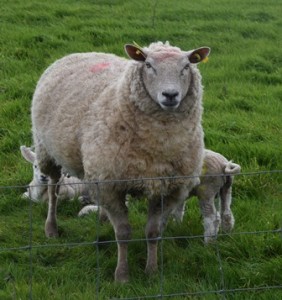 My favorite usage from Helen came up when she was describing a telephone call she had made a few days earlier to the office of the Taoiseach [TEE-shook] or prime minister to complain about Internet access in this semirural area. She was very upset with the government’s long record of unfulfilled promises on this issue and said so in no uncertain terms to the poor bloke answering calls that day. Describing her diatribe to us, she said “I had a murder with him!”
My favorite usage from Helen came up when she was describing a telephone call she had made a few days earlier to the office of the Taoiseach [TEE-shook] or prime minister to complain about Internet access in this semirural area. She was very upset with the government’s long record of unfulfilled promises on this issue and said so in no uncertain terms to the poor bloke answering calls that day. Describing her diatribe to us, she said “I had a murder with him!”
“Bap,” “blaa,” and “brack” may sound like noises emanating from a distressed sheep, but they are actually delicious varieties of yeast bread that can be found on many an Irish menu and in bakeries. I am often called upon to explain these words to our visitors. Baps originated in Scotland, a country that seems to understand how to make baked goods such as shortbread, oatcakes, and various kinds of dessert puddings such as clootie dumplings. Baps are yeast rolls, usually the size of a saucer and round; they are sliced horizontally so they can be toasted or used for sandwiches. Light but chewy, baps are what standard American hamburger buns wish they were. A blaa [BLAH] is a Waterford specialty, sometimes called a “Waterford bap,” now making its way onto menus around the country. The recipe is very similar to the bap recipe, though blaas are smaller and fatter and are dusted with flour when removed from the oven. Like baps, blaas are eaten with butter at breakfast, served as dinner rolls, or filled to make sandwiches. Brack, also “brack bread,” “tea brack,” or “barmbrack” is a delicious raisin bread sometimes made in round pans and rising to be quite tall. At Halloween, or Samhain [SOW-en] in Irish, items like a toy gold ring, a small coin, or a piece of cloth are wrapped in wax paper, kneaded into the dough, and used to tell the fortunes of whoever gets one of them in a slice of the bread. We had barmbrack last Halloween, and I guess I’ll be getting married soon because I got the wedding ring.
And while we’re on the subject of bread, let’s talk about scones, a variation on the soda bread (no yeast) recipe; scones were invented in Ireland (or so say some sources) and are known around the world, appearing in many different flavors and guises. “Scone rhyming with cone,” “scone rhyming with con,” or “scone rhyming with lawn”– that is the question. Scone/con seems to be a northern thing, prevailing in Scotland, the northern counties of the UK, and Northern Ireland. A quick survey of my Irish friends and my own impressions say scone/cone dominates here in the Republic. When in doubt about pronunciation, you can always point, a solution that also addresses the vexing problem of what to call the different flavors and styles. Ron votes with the scone/con faction, while I am firmly in the scone/cone camp.
The women in my exercise class at the local gym go for coffee (and scones) after class in the café at the gym (the cappuccino is excellent) and over the last eight months have provided me with lots of insight about Irish life, as well answers to my many questions about words and other subjects. The other day we were talking about the high number of homeless people in Dublin, the circumstances and causes, which are very similar to those in the US. One of the women said she feared some of the people begging on the streets were “chancers,” or people pretending to be poor, and the others debated this point for a while. When I asked about the meaning of the word, they explained that a chancer is a pretender or a fake and assured me that chancers can be found not only on the streets of Irish cities but in the government, the banks, real estate, the law profession, etc.
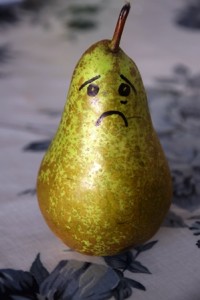 “We were doing quite well until the housing market went pear-shaped.” This is one of my favorite Irish expressions, and I’ve noticed that it has slowly been making its way across the pond. “To go pear-shaped” means to fail or fall apart; an American equivalent to the phrasing in the sentence above might be “until the bottom fell out of the housing market.” Whenever I hear it I have this very vivid image of a round pear suddenly and embarrassingly feeling all its roundness drop to make a huge belly below its little head.
“We were doing quite well until the housing market went pear-shaped.” This is one of my favorite Irish expressions, and I’ve noticed that it has slowly been making its way across the pond. “To go pear-shaped” means to fail or fall apart; an American equivalent to the phrasing in the sentence above might be “until the bottom fell out of the housing market.” Whenever I hear it I have this very vivid image of a round pear suddenly and embarrassingly feeling all its roundness drop to make a huge belly below its little head.
Here in Ireland it used to be considered very “American,” and therefore somewhat crude and improper, to say “Hello” when greeting someone instead of “Good morning,” Good afternoon, or “Good evening,” depending on the time of day. Like tea bags, today “hello” has been accepted and is in wide use. A similarly shocking American habit has to do with how we use forks. Like most Europeans, the Irish use their fork and knife together to eat, using the knife to position the food on the back of the fork and then lifting the fork to the mouth; the American style is, as you know, for a right-handed person to use the fork in the left hand with the knife in the right hand for cutting and then change the fork to the right hand for scooping or spearing the food and bringing it to the mouth. Back in the day, children in Ireland were admonished if they tried to use their forks “like a shovel, the way Americans do!” Although eating styles have not changed for the most part, the American way of using a fork is no longer disparaged as it once was.
And now for the PG-13 section that you’ve all been waiting for, tastefully positioned “below the fold” so as not to catch people off guard. As I have noted before, things language-wise are a bit looser in Ireland than in the US—in a good way—and salty language is more common, not only in conversation, but on television and not just late at night on obscure cable channels. The ladies in my exercise class—professionals, homemakers, and retirees, quite a few of whom are older than I am—have no problem peppering their conversation with words that would cause many Americans to reach for an initial letter and a hyphen, as in the f-word, the s-word, the b-word and many more. One of them told a hilarious story the other day about one of her children, the youngest of a boisterous lot of five or six, who at two years old had never spoken: when he finally did speak, it was to shout “fuck” as loud as he could. When she told this story, the rest of us laughed until we cried.
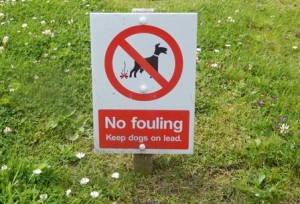
I have a collection of these “shite” photos from Ireland because I love the added touch of wavy lines to show that the doggy poo poo does indeed stink.
The students I bring to Ireland are always rather surprised to hear that and other similar words on regular evening TV shows, and I must say, it makes American television look a bit prissy. How many times while watching Law and Order in any of its incarnations have you wondered if those tough characters really talk that clean? And does all the bleeping out on The Daily Show hide or emphasize what’s being said? Just the other night I saw an Irish television program in which one elderly politician mentioned that some of his colleagues were more than willing to “lick arse,” a blunt and honest phrase that simply wouldn’t be broadcast on network television in the US, though “arse” is to the American ear somehow more genteel than “ass”—maybe because we associate it with British English.
British English also gives us “shite,” a variation on “shit” that because of the long vowel is simply more pleasing to say. “Shite” can be stretched to several syllables and allows for an array of emotions—wonder, anger, surprise, etc.—and pitches to be attached to it. The origin of this word is legitimate Middle English “schīte,” cognate with Middle Low German—a very respectable etymology and firm ground for “shite” as used in Ireland and the UK. Another great and quite common word in Ireland is “gobshite”: “gob” means mouth, and a “gobshite” is a loud-mouthed person who talks bullshit. The word was a favorite exclamation of Father Jack’s on the British/Irish classic television comedy Father Ted. Over its many episodes this show hilariously satirizes this kind of language along with many other subjects. Treat yourself to this wonderful scene in which the housekeeper Mrs. Doyle (played by the endlessly versatile Pauline McLynn) rants about the use of such “unbelievable language” in contemporary literature.

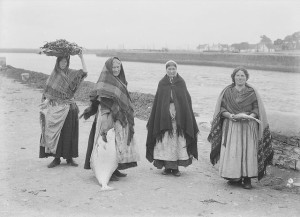
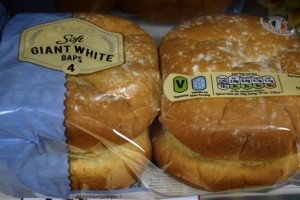
Christine, I am so enjoying your blog. The language posts are so illuminating! I’ve never been to Ireland but I can now say it’s definitely on my list!
Thanks Melissa. It’s great to know that you are out there reading!
So lovely to dip back into Ireland again through your wonderful blog. A language lover myself, I enjoyed every sentence here–form and content beautifully blended. I learned so much and can’t wait to impress (perhaps depress) friends to new additions to my vocab.
impress friends WITH the new additions to my vocab!